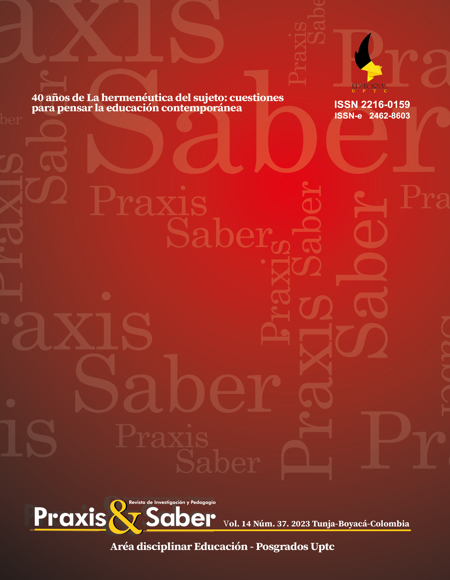The teaching job seen from the constructs of normalist teacher educators in the state of Oaxaca, Mexico

Abstract
Undertaking studies on the initial training of normalist teacher educators requires problematizing it from multiple perspectives and contexts in order to promote research in accordance with the institutional and formative realities that are generated in normalist teacher training schools (educational centers born during the Mexican Revolution of 1910 to provide education opportunities for people living on the countryside). This article presents a study focused on analyzing the conceptions about the teaching work communicated and performed by two teacher educators during their pedagogical work in two normalist teacher training schools located in the state of Oaxaca, Mexico. The study was developed from an interpretative methodological perspective based on Grounded Theory, supported by participant observation and in-depth interviews. The results show the configuration of two emerging categories: teaching work as social service and teaching work as community commitment. The notions of teaching work make visible the experiences of the teacher educators, a way of seeing, being, and relating to one’s own person and to the normalist teaching profession.
Keywords
initial training, teacher educators, teaching work, normalist teacher, training schools
References
- Apple, M. W. (2012). Poder, conocimiento y reforma educacional. Miño y Dávila, Universidad Nacional de La Pampa.
- Bernstein B. (1997). La estructura del discurso pedagógico. Morata.
- Carrero V., Soriano R. M. y Trinidad, A. (2012). Teoría Fundamentada. Grounded Theory. El desarrollo de la teoría desde la generalización conceptual. Cuadernos Metodológicos, 37. Centro de Investigaciones Sociológicas.
- Castañeda Salgado, M. A. y Sernas Hernández, C. (2017, noviembre 20-24). Formación y prácticas de formadores en procesos de reforma de la educación normal. [Presentación de ponencia]. XIV Congreso Nacional de Investigación Educativa, San Luis Potosí, México.
- Contreras Domingo, J. (2010). Ser y saber en la formación didáctica del profesorado: una visión personal. Revista Interuniversitaria de Formación del profesorado, 24(2), 61-81. http://www.redalyc.org/articulo.oa?id=27419198004
- Fierro C. y Fortoul B. (2017). Entretejer espacios para aprender y convivir en el aula. SM de Ediciones México.
- Fortoul B. y Fierro, C. (Coords.) (2021). Analizar las prácticas docentes. Aproximaciones desde el interaccionismo. Newton, Universidad LaSalle, Ibero León.
- Fortoul, O. M., Güemes, G. C., Martell, I. F. y Reyes, J. M. (2013). Formación inicial de docentes para la Educación Básica. En P. Ducoing Watty y B. Fortoul Ollivier. (Coords.). Procesos de formación. (1), 2002-2011 (pp. 153-192). COMIE.
- Freire, P. (2007). La educación como práctica de la libertad. Siglo XXI.
- Glaser, B. G. y Strauss, A. L. (1967). The discovery of Grounded Theory. Strategies for Qualitative Research. [versión DX Reader]. http://www.sxf.uevora.pt/wp-content/uploads/2013/03/Glaser_1967.pdf
- Giroux, H. A. (2014). Teoría y resistencia en educación. Siglo XXI y CESU-UNAM.
- Giroux, H. A. (1993). La escuela y la lucha por la ciudadanía. Siglo XXI.
- Gómez Sollano, M. y Adams, T. (2019). Hegemonía y alternativas pedagógicas. Los nudos ciegos de la teoría. Educação (Unisinos). 23(1), 124-140. https://doi.org/10.4013/edu.2019.231.08 DOI: https://doi.org/10.4013/edu.2019.231.08
- Marcelo C. y Vaillant, D. (2018). La formación inicial docente: problemas complejos-respuestas disruptivas. Cuadernos de Pedagogía, 489, 27-32. http://www.denisevaillant.com/wp-content/uploads/2018/06/Cuadernos-de-Pedagogia_489-2018_DV-CM.pdf
- Medrano Camacho, V., Ángeles Méndes E. y Morales Hernández, M.A. (2018). La educación normal en México. Elementos para su análisis. Perfiles educativos, XL(160). 192-208. http://www.iisue.unam.mx/perfiles/articulo/2018-160-la-educacion-normal-en-mexico-elementos-para-su-analisis.pdf DOI: https://doi.org/10.22201/iisue.24486167e.2018.160.58781
- Pegalajar Palomino, M. C. (2017). Análisis del autoconcepto y realización personal: nuevos desafíos en la formación inicial del profesorado. Contextos educativos, 2, 95-111. https://dialnet.unirioja.es/descarga/articulo/5835212.pdf DOI: https://doi.org/10.18172/con.2986
- Pérez Gómez, A. I. (2013). La función y formación del profesor/a en la enseñanza para la comprensión. Diferentes perspectivas. En J. Gimeno Sacristán y A. I. Pérez Gómez (Eds.). Comprender y transformar la enseñanza (pp. 398-429). Morata/Colofón.
- Perrenoud P. (2001). La formación de los docentes en el siglo XXI. Revista de Tecnología Educativa, XIV(3), 503-523. http://academicos.iems.edu.mx/cired/docs/tg/macroacademiaquimica/La%20formacion%20de%20los%20docentes%20en%20el%20siglo%20XXI_Perrenoud.pdf
- Ripamonti, P.; Lizana, P. y Yori, P. (2016). La construcción de los saberes prácticos docentes. Una mirada desde narraciones biográficas y pedagógicas. Saberes y prácticas. Revista de Filosofía y Educación. 1, 1-23. https://revistas.uncu.edu.ar/ojs/index.php/saberesypracticas/article/view/780
- Sánchez Ponce, C. (2013). Estructuras de la formación inicial docente. Propuesta de un sistema clasificatorio para su análisis. Perfiles Educativos, XXXV(142), 128-148. http://www.scielo.org.mx/scielo.php?script=sci_arttextypid=S0185-26982013000400009
- Strauss A. y Corbin J. (2002). Bases de la investigación cualitativa. Técnicas y procedimientos para desarrollar la Teoría Fundamentada [versión DX Reader]. https://diversidadlocal.files.wordpress.com/2012/09/bases-investigacion-cualitativa.pdf
- Torres del Castillo, R. M. (1998). Nuevo papel docente. ¿Qué modelo de formación y para qué modelo educativo? Perfiles Educativos, 82. http://www.redalyc.org/articulo.oa?id=13208202
